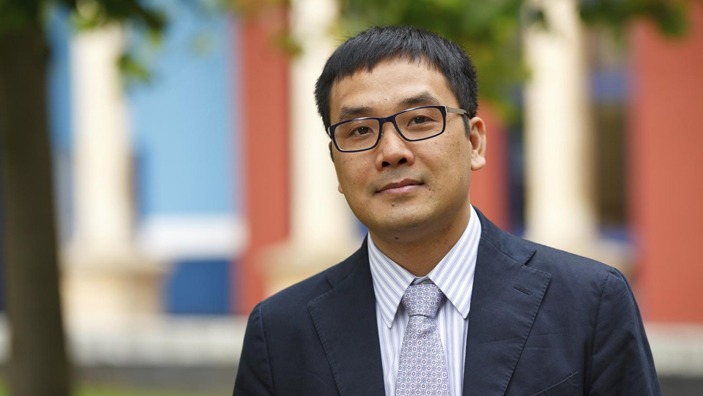Associate Professor in Finance
BA (FTU Hanoi), MBA (CFVG Hanoi), MPA (ENA Paris), MA (EHESS Paris), PhD (HEC Paris)
My research interests include corporate finance, empirical finance, and corporate governance. I was previously an intern of the Ecole Nationale d’Administration at the Cabinet of the Préfet des Ardennes in France, and worked for AXA Investment Managers Paris as a graduate summer intern in the Fixed Income Division.
I’m a member of the Finance subject group at Cambridge Judge Business School, which focuses on the investment and financial decisions of firms and institutions.

Professional experience
Bang was an intern and working as a Credit and Corporate Banking Analyst at Credit Lyonnais Vietnam in 1996. He was an intern of the Ecole Nationale d’Administration in 1997 and 1998 at the Cabinet of the Préfet des Ardennes (Préfectures des Ardennes, Champagne Region, France.) He also gained experience when working for AXA Investment Managers Paris as a graduate summer intern in the Fixed Income Division.
Previous appointments
Before joining Cambridge Judge Business School in September 2010, Bang was an assistant professor of finance at the Chinese University of Hong Kong. He graduated from HEC Paris in July 2006 with a PhD degree in finance. From January 2003 to April 2004, Bang was a visiting scholar in the Finance Department at Stern School of Business, New York University.
Publications
Journal articles
- Nguyen, B.D. (2015) “Is more news good news? Media coverage of CEOs, firm value, and rent extraction.” Quarterly Journal of Finance, 5(4): 1-38 (DOI: 10.1142/S2010139215500202) (also available online via the SSRN)
- Nguyen B.D. and Nielsen, K.M. (2014) “What death can tell: are executives paid for their contributions to firm value?” Management Science, 60(12): 2994-3010 (DOI: 10.1287/mnsc.2014.2011)
- Nguyen, B.D. (2013) “It’s not what you know, it’s who you know: CEO-director social connections and the effectiveness of boards of directors.” Strategic Direction, 29(3): 3-4 (DOI: 10.1108/02580541311304553)
- Nguyen, B.D. (2012) “Does the Rolodex matter? Corporate elite’s small world and the effectiveness of boards of directors.” Management Science, 58(2): 236-252 (DOI: 10.1287/mnsc.1110.1457)
- Nguyen, B.D. (2011) “Ownership structure and board characteristics as determinants of CEO turnover in French-listed companies.” Finance, 32(2): 53-89 (DOI: 10.3917/fina.322.0053)
- Nguyen, B.D. and Nielsen K.M. (2010) “The value of independent directors: evidence from sudden death.” Journal of Financial Economics, 98(3): 550-567 (DOI: 10.1016/j.jfineco.2010.07.004)
Books, monographs, reports and case studies
- Boubaker, S., Nguyen, B.D. and Nguyen, D.K. (eds.) (2012) Corporate governance: recent developments and new trends. Berlin: Springer Verlag.
Working papers
- Lee, Y.T., Do, Q.A., Nguyen B.D. and Nguyen, K.T. (2013) “Political connections and firm value: evidence from the regression discontinuity design of close gubernatorial elections.” Social Science Research Network Working Papers Series, No.2190372. Rochester, NY: Social Science Electronic Publishing.
- Nguyen, B.D. and Nielsen K.M. (2013) “When blockholders leave feet first: do ownership and control affect firm value?” Social Science Research Network Working Papers Series, No.2285453. Rochester, NY: Social Science Electronic Publishing.
- Nguyen B.D., Do, Q.A., Lee, Y.T. and Nguyen, K.-T. (2012) “Out of sight, out of mind: the value of political connections in social networks.” Social Science Research Network Working Papers Series, No.1884820. Rochester, NY: Social Science Electronic Publishing.
Visit the Social Science Research Network for more of Dr Nguyen’s publications and papers
Awards and honours
- Best Corporate Finance Paper Award, “Political Connections and Firm Value: Evidence from Regression Discontinuity Design of Close Gubernatorial Elections”, Society of Financial Studies Finance Cavalcade, Florida, USA, 2013
- Xia Yihong Best Paper Award, “The Value of Independent Directors: Evidence from Sudden Deaths,” China International Conference in Finance (organised by MIT Sloan School of Management and Tsinghua University), Guangzhou, China, July 2009
- Barclays Global Investors’ Best Doctoral Paper Award, European Finance Association (EFA) Meetings, Zurich, Switzerland, August 2006
- French National Foundation for Education in Management (FNEGE) & French Finance Association (AFFI) Best PhD Dissertation Award in France, 2006
News and insights
Companies whose directors are connected to winning US gubernatorial candidates increase in value and are more likely to receive state subsidies, loans and tax credits, says new study co-authored at Cambridge Judge Business School. The late Speaker of the US House of Representatives, Thomas P. "Tip" O'Neill, famously said that "all politics is local." A new study co-authored at University of Cambridge Judge Business School finds that this applies big time to companies whose directors have connections to winning US gubernatorial candidates. Local companies whose directors have connections (measured by college alumni ties) to the winning US gubernatorial candidates over an 11-year period (1999 to 2010) enjoyed increased value and are more likely to benefit from state subsidies, loans, and tax credits. These local firms also secure better access to bank loans, with lower interest rates, and enjoy better long-term performance. Twelve states hold gubernatorial elections in November 2016: Delaware, North Carolina, New Hampshire, Vermont, West Virginia, Indiana, Missouri, North Dakota, Montana, Utah, Washington and Oregon. "Many studies have focused on the internal role of directors in corporate governance, but this study looks instead at how directors' external social networks impact firm value and decisions," says co-author Bang Dang Nguyen,…
For firm valuation, more news (good and bad) about CEOs is good news. More news about a company's chief executive – positive and not – is good news when it comes to the firm's valuation, according to a study at University of Cambridge Judge Business School. More media coverage of a CEO is a "channel of investor recognition" that also helps the chief executive extract higher compensation, says the study published in the Quarterly Journal of Finance. "The study shows that, in the long term, if a firm's CEO attracts more media coverage the firm will do better in terms of valuation," says Bang Dang Nguyen, University Lecturer in Finance and Director of the MPhil in Finance Programme at Cambridge Judge. We live in a world of incomplete information, and the study shows that additional coverage of a company's CEO helps fill that information gap for investors, and this contributes to additional valuation. The issue of CEO press exposure – whether and how much – is one regularly debated by company strategists. So the study provides a key insight: despite the risk of negative news coverage now and again, it is advantageous to firm valuation for a CEO to be…
All sides on the debate into top executives' pay have usually found common ground on just one thing – that there is no empirical way of telling if a CEO is overpaid or not. Now two academics claim they can provide this missing piece of the puzzle with a new economic model that separates the overpaid from the justly paid, and puts a figure on CEO contribution to shareholder value for the first time. Bang Dang Nguyen of the University of Cambridge Judge Business School and Kasper Meisner Nielsen from the Hong Kong University of Science and Technology recently concluded a five year study into the thorny question of CEO pay, reaching some startlingly cut and dried conclusions. They claim they have provided empirical evidence to show that, 1) 42% of top executives are overpaid while 58% are not and, 2) on average, a top executive takes home 71 cents, (a CEO, 65 cents), of every dollar they create for shareholders. In a forthcoming article for Management Science journal, Nguyen and Nielsen suggest their research has important real-world implications for how top executive pay is regulated, (including the controversial EU cap on banker bonuses), and the general debate on top…
Media coverage
A Family | 28 November 2022
Foreign Trade alumnus becomes Professor of Cambridge University – Top 2 university in the world
Bang Dang Nguyen, Associate Professor in Finance at Cambridge Judge Business School, is featured in this article about Vietnamese professors.
Cambridge Business Magazine | 1 June 2016
Link between elections and company directors highlighted
Companies whose directors are connected to winning US gubernatorial candidates increase in value and are more likely to receive state subsidies.
The Economist | 15 April 2016
Who wins when a politician wins
Companies whose directors are connected to winning US gubernatorial candidates increase in value and are more likely to receive state subsidies.
Business Review Europe, 26 May 2015
CEOs? Publish and be damned!
Financial Times, 20 May 2015
Column inches aid share prices
Education Times, 22 September 2014
Are CEOs underpaid?
The Economist, 6 September 2014
The final reckoning
Management Today, 27 August 2014
Study: even dead CEOs get paid too much
Financial Times
Market reaction to a CEO’s death can reveal attitudes to pay
The Harvard Law School, 25 September 2013
Do ownership and control affect firm value?
The Independent, 28 April 2013
Boards braced for more trouble from investors
The Sunday Times, 2 September 2012
Why my directors are a lot like me
TIME Magazine, 13 August 2012
The John Lewis economy: why is Downing Street looking to Britain’s most beloved department store?



